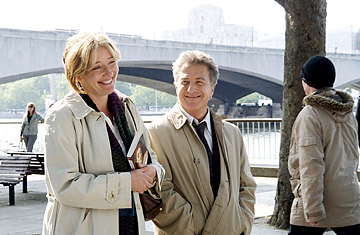
Things aren't going so well for Harvey Shine (Dustin Hoffman). His job writing jingles for television commercials is in jeopardy. He's got a middle seat in coach for his trip to London, where his estranged daughter is getting married. When he gets there, all rumpled and out of sorts, he finds he is not booked into the same hotel as the rest of the wedding party, which pretty much ignores him anyway.
Things are marginally better for Kate Walker (Emma Thompson), who works for an airline as a greeter but has pretty much given up on romance. Her major interest is in the fiction-writing class she dutifully attends. Her major annoyance is her needy and timorous mother (the always welcome Eileen Atkins), who calls her about a dozen times a day, mainly to inquire about Kate's progress in the Mating Game.
It is inevitable that these two people meet (with no particular cuteness), then endure some mild romantic comedy frustrations on their way to gentle resolutions of all their problems. I don't know why we are paying any particular attention to Last Chance Harvey, which was written and directed with no particular distinction by Joel Hopkins — except that Hoffman and Thompson rather unaccountably received Golden Globe nominations for their work in it. Of course, the Globe nominations are the product of the Hollywood Foreign Press Association, a group for whom English is at best a second language. It is also perhaps useful to recall that they tend to be hungry for major stars to decorate their red carpet when they pass out their transcendently meaningless awards on their highly rated, if not highly regarded, television show in mid-January. I suppose Hoffman and Thompson have endured worse indignities in the course of their excellent careers. And I suppose we have endured worse movies than Last Chance Harvey in the course of our moviegoing careers — or for that matter, during the last two weeks.
Both actors are amiable, civilized and essentially unthreatening, and the sunswept London through which they move is a compendium of the standard tourist views of the city (surely there's somewhere besides the Thames South Bank for lovers to canoodle?). Still, the movie is a whiffleball, since you know from the outset that the only place the woebegone Harvey has to go is upward from his depressed state and that the only place Kate has to go is outward from her withdrawn state. As the movie ambles along, largely laughless and largely without sexual energy — just because a couple is slightly odd does not mean that they are greatly stirred by their differences — you begin to notice that the director is almost obsessively concerned with the height difference between his leads. Hoffman is, as we all know, rather short in stature while Thompson is tall. This means Hopkins doesn't risk a lot of shots where they are seen walking side by side, hand in hand. They are constantly framed in such a way that they appear to his lens to be about the same size. But that means that they are often almost shouting their quips and their tentative endearments at some distance from one another.
This awkwardness does not improve the intimacy of the movie. Neither does the fact that, nationalities aside, there's really no reason for them not to get together. In life, good-natured people set aside their small, decidely undramatic differences and get together all the time. In the movies we expect their eccentricities to be more sharply defined and to pose a real, or silly, or even dangerous challenge to their pursuit of happiness. If that doesn't happen, the blahs take over and we get to wondering why these pleasant actors bothered to make this film and, worse, why we're bothering to see it.